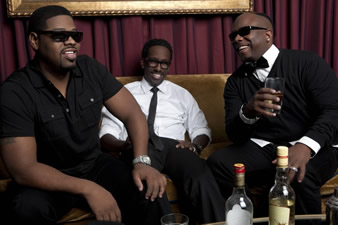After enjoying a very sparsely attended (though fine) concert at Hill Hall two nights before, it was good to see a large and enthusiastic crowd at Hill Hall (on a Tuesday night, no less) for a narrated concert by the North Carolina Jazz Repertory Orchestra, with guests trumpet soloist Claudio Roditi and narrator David Hartmann. Although North Carolina was the birthplace and incubator for important jazz talents, among them John Coltrane (born in Hamlet, NC) and Thelonious Monk (born in Rocky Mount, NC), those accustomed to jazz offerings in the larger metropolises up North may often find slim pickings in North Carolina, both in terms of local performers and performances, and in terms of visitors from elsewhere. Jim Ketch’s North Carolina Jazz Repertory Orchestra, now marking 20 years of activity (it was founded in 1993), helped to kick off the 36th Carolina Jazz Festival with a program spanning 100 years of jazz styles ranging from Dixieland to a big band arrangement by a young student at Durham NCCU.
The NCJRO is a traditionally arranged big band, with five saxophones, four trumpets, four trombones, rhythm section of piano, guitar, bass and drums, and vocalists Kathy Gelb and Mark Wells. Director Ketch programmed an evening with five sections. The concert opened with a recreation of “Tiger Rag” (as performed by the 1918 Original Dixieland Jazz Band), with an impressive front line of clarinet, trumpet and trombone, moving on to two Ellington style arrangements, first a “Portrait of Louis Armstrong” from the New Orleans Suite (featuring an admirably brassy trumpet solo in the Armstrong style from Ketch), and climaxing with the famous “It Don’t Mean a Thing If It Ain’t Got That Swing,” with the vocal soloist Kathy Gelb. Gelb has the memories and recordings of some great singers to compete with, and to these ears she had neither a special or beautiful vocal instrument, nor a particular skill in improvisation to compensate (though we did hear some scatting on the second chorus, after a relatively straight reading of the first).
The second set focused on the great swing bands, with numbers celebrating Fletcher Henderson; “Let’s Dance,” with a clarinet solo by Gelb; a hot and swinging reading of the Ellington classic “C Jam Blues” (arrangement by Don Sebesky), with solos by pianist Ed Paolantonio and muscular saxist Aaron Hill, and finally Jimmie Lunceford, with “Lunceford Special.” closing with screaming high notes from the trumpet sections (especially leader Benjy Springs).
A set featuring the Great American Songbook brought back Kathy Gelb for two numbers, “Honeysuckle Rose” and “Strike up the Band,” and brought out Mark Wells, sharply dressed in a tux, and displaying a suave Las Vegas delivery for “The Lady is Tramp” and “Brazil” (the Ary Barroso classic, but with a swing, not samba, rhythm).
The remaining two sets purposed to cover the remaining time between the late forties and the present day, but instead showed the size of the gap that was created and still remains between the idiom of the big bands, and the innovative music that was created by small ensembles, particularly between 1950 and 1980. The fourth set included nods to Charlie Parker, Dizzy Gillespie, and Mingus, all with tunes from prior to 1960. Arguably the two greatest figures of twentieth-century jazz, John Coltrane and Miles Davis, were not present in any way, nor the radical changes that they brought to the music, let alone any of those that followed them. Even in the domain of the big bands, there were important groups in this period, but not in the trajectory of the NCJRO. Trumpet soloist and Artist-in-Residence Claudio Roditi was heard with a reduced ensemble (soloists plus rhythm section) for “Now’s the Time”, displaying an intense control and beautiful tone along with creative soloing.
The final set led off with a composition by Paquito D’Rivera, “I Remember Diz,” bringing together motives from compositions by Gillespie, with fine solos from Gregg Gelb (clarinet) and Roditi. A Cedar Walton number with a Latin tinge (“Bolivia”) brought the final composition, a piece from Jamnel D. Fields (student at NCCU) and commissioned by and composed in honor of Gerald S. Wilson, “Leimert Park” with the composer directing. Fields closed the evening in great style, with a composition featuring slashing gestures and plenty of space for solos from the members of the band.











